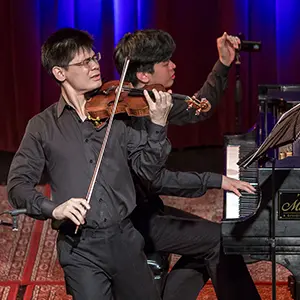Protégés at the Alberta Rose

Discover the next generation of classical music stars in this program of Ravel, Mozart, and Messiaen’s Quartet for the End of Time performed by Chamber Music Northwest Protégé Project artists and mentors. Chamber Music Northwest’s Protégé Project is a world-class professional residency for emerging professional musicians. Since its founding in 2010, Chamber Music Northwest’s Protégé Project has played a key role in launching the professional careers of dozens of America’s finest young chamber musicians.
Premieres July 20 @ 7 pm PT
Available through July 21 @ 11:59 pm PT
Program
Click on any piece of music below to learn more about it.
- MAURICE RAVEL Chansons madécasses (1925-1926)
Evanna Chiew, mezzo-soprano
Tara Helen O’Connor, flute
Jay Campbell, cello
Yevgeny Yontov, pianoOriginally performed on Wednesday, July 15th, 2015|Alberta Rose Theatre @ 8pm
See our Program Book for program notes.
- MOZART Violin Sonata in B-flat Major, K. 378
Angelo Yu, violin
Andrew Hsu, pianoOriginally performed on Wednesday, July 27th, 2016|Alberta Rose Theatre @ 8pm
See our Program Book for program notes.
- OLIVIER MESSIAEN Quartet for the End of Time (1940 - 1941)
OLIVIER MESSIAEN (1908–1992)
Quartet for the End of TimeI. Liturgie de cristal (Crystal Liturgy)
II. Vocalise, pour l’Ange qui annonce la fin du temps (Vocalise, for the Angel who Announces the End of Time)
III. Abîme des oiseaux (Abyss of Birds)
IV. Intermède (Interlude)
V. Louange à l’Éternité de Jésus (Praise to the Eternity of Jesus)
VI. Dane de la fureur, pour les sept trompettes (Dance of Fury, for the Seven Trumpets)
VII. Fouillis d’arcs-en-ciel, pour l’Ange qui annonce la fin du temps (Tangle of Rainbows, for the Angel who Announces the End of Time)
VIII. Louange à l’Immortalité de Jésus (Praise to the Immortality of Jesus)In the late spring of 1940, German troops stormed through France, capturing more than a million prisoners including the composer Olivier Messiaen. After a long journey, Messiaen arrived at the Stalag VIII A prison camp in Görlitz, Germany, plagued with severe food shortages, poor shelter, and countless other hazards.
To keep morale up, prison guards encouraged the prisoners to entertain themselves. Messiaen, a pianist, decided to write a new work titled Quatuor pour la fin du temps (Quartet for the End of Time), to be performed alongside three fellow prisoners: a violinist, a cellist, and a clarinetist. The premiere took place in a camp barracks on January 15, 1941, before an audience of prisoners and guards alike. Messiaen later recalled, “Never was I listened to with such rapt attention and comprehension.”
Some hear the Quartet for the End of Time as a reflection of Messiaen’s experience in the prison camp: anguished, violent, apocalyptic, and despairing. Others hear it more as an escapist apparition, the music of a composer falling back on his religious beliefs to break free from the oppressive banality of life in prison. Murky harmonies and inconsistent rhythms create a feeling of timelessness, but perhaps the most prominent musical element that shapes the quartet is birdsong. Messiaen believed that birds symbolized a higher power, able to fly above our mundane concerns. In the context of his captivity, birdsong becomes an even more potent symbol: the power to simply fly beyond the prison’s walls.
—© Ethan Allred

